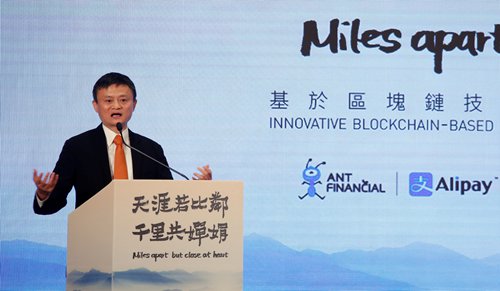Tech giant’s service will have a niche market but may be used for money laundering: expert
Although blockchain's support of Bitcoin and other cryptocurrencies has tarnished the hot technology with the "illegal dealings on the dark web" brush, Jack Ma Yun, founder of Alibaba Group Holding, believes it can in fact move into mainstream finance and truly revolutionize the traditional financial system.

Alibaba Chairman Jack Ma Yun speaks at a news conference on blockchain in Hong Kong on Monday. (Photo: VCG)
At an event held in Hong Kong on Monday, Alibaba's financial affiliate Ant Financial Services Group launched a cross-border remittance service based on blockchain, aiming to help Alipay's users in Hong Kong send money to the Philippines at cheaper costs and faster speeds than traditional firms like MoneyGram, which Ant failed to acquire in 2017.
"Due to the US' reasoning, our deal with MoneyGram did not succeed, so I said, 'Let's make one better that uses the most advanced technology'," Ma, a determined pioneer, said during the event.
The blockchain money transfer service has been Ma's "most precious project" over the past six months, as he described it.
Deep, dark web
But one expert expressed concerns that the service could be exploited by domestic money laundering criminals operating across Asia.
The Philippines was labeled by the US as a "major money-laundering country" in the 2017 International Narcotics Control Strategy Report, published in March 2017.
Ant's blockchain remittance service is actually an internal settlement between two cross-border branches of an international bank, therefore, "whether a transaction follows regulations and obeys money laundering law is mainly down to self-censorship," Zhao Yao, contract research fellow at the Institute of Finance and Banking at the Chinese Academy of Social Sciences, told the Global Times.
According to a press release, Ant's blockchain money transfer service will not involve any cryptocurrencies and Standard Chartered will act as the settlement bank for the service.
In an exclusive interview with the Global Times, Peng Pai, a PR representative of Ant Financial, stressed many times that every blockchain transaction will be checked by regulators and authorities.
If any transactions are suspected to be infringing international money laundering law, they will be canceled. "With blockchain, the transaction process will become faster, but this does not mean it will face less supervision," said Peng.
Forming the basis of Bitcoin, blockchain, also known as distributed ledger technology, is the finance industry's hottest tech buzzword at the moment. It is widely perceived as a more transparent and secure solution that not only can track every single transaction but also find a way to rule out any attempts at fraud.
Speedy transactions
Since the technology does not rely on centralized authorities, it can indeed simplify and facilitate transactions across borders, said industry experts.
During the event, Grace, a Filipina working in Hong Kong, was invited by Ant on stage to demonstrate the transfer process by sending money to her family in the Philippines in only three seconds. By contrast, the traditional remittance service takes 10 minutes or even several days.
The service will have a niche market, targeting about 200,000 Filipino workers in Hong Kong who sent about $700 million back to their hometowns last year, according to data from the central bank of the Philippines.
The Philippines is the world's third-largest remittance market, with 2017's inflows standing at $33 billion, data released by the World Bank's latest Migration and Development Brief showed.
There are already some start-ups such as US company Ripple using cryptocurrencies for international payments and transactions. And traditional financial institutions are trying to adopt the trend as well.
Global financial messaging provider SWIFT, together with 34 global transaction banks including Commerzbank, Societe Generale and JPMorgan Chase Bank, started a test project to pilot blockchain for bank-to-bank money transfers last year.
And in a report based on the test released on March 8, SWIFT, which handles more than half of all high-value cross-border payments, said the test went "extremely well" but that "further progress is needed" on the technology before it is ready for mainstream use.
Many banks would have to significantly overhaul their systems and operations to adopt blockchain so they can handle their payments across the border, according to the report.
But Zhao said blockchain may not be the most ideal way to transfer money abroad.
"Speed is not what matters the most in a cross-border transaction, rather how to hedge the risk of loss resulting from fluctuations in foreign exchange rates," he said. "Blockchain transfers can be completed in seconds, giving users and banks less time to weigh the risk."
The faster option is not the better option, especially for people who transfer money to the wrong person. "Consumers always have time to cancel an overseas transfer before our banks settle the transaction," a Beijing-based bank clerk surnamed Chen told the Global Times.
Ant's new remittance service has an upper limit of HK$5,000 ($637) per transaction and HK$ 60,000 per year. Users will not be charged any fees for the first three months, according to a press release the company sent to the Global Times, but a commission rate may be applied in the future.


